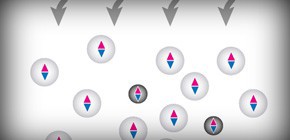
Boosting Nuclear Magnetic Resonance (NMR) without resorting to low temperatures
Major step in enhanced NMR/MRI sensitivity
Researchers at the Division of Advanced Electronics and Optical Science, Systems Innovation, Graduate School of Engineering Science, Osaka University, succeeded in drastically increasing the intensity of Nuclear Magnetic Resonance (NMR) signal of organic compounds in a glassy matrix with dynamic nuclear polarization (DNP) using photoexcited triplet electrons.
Conventional DNP can only be conducted at extremely low temperatures; however, this group's new technique aligns nuclear spin through microwave irradiation significantly higher temperatures. In fact, they achieved H spin polarizations of 34 % at room temperature.
This group's achievement is capable of enhancing the sensitivity of both NMR and MRI at a low cost, contributing to chemistry and medicine, especially in microanalysis of materials and living substances both of which are damaged by extremely low temperatures.
Researchers in this group Ken-ichiro TATEISHI , 3rd year student in the first-term of a doctoral program (currently a Researcher, RIKEN) , Makoto NEGORO (Assistant Professor), Akinori KAGAWA (Assistant Professor), Masahiro KITAGAWA (Professor) at the Graduate School of Engineering, Osaka University.
Abstract
Utilizing photoexcited triplet electrons, dynamic nuclear polarization (DNP) has achieved, in a glassy matrix at 0.40 T and 120 K, a 1H spin polarization of 1.45 %, which is 4250 times larger than the thermal 1H spin polarization. In a glassy matrix, various molecules of interest, including 2,3,4-trifluorobenzoic acid and 5-fluorouracil can be codoped with polarizing agents; polarizing these co-dopants with DNP was also successful.

Figure 1

Figure 2
To learn more about this research, please read the full research report entitled " Dynamic Nuclear Polarization with Photoexcited Triplet Electrons in a Glassy Matrix " at this page of the Angewandte Chemie International Edition website.
Related link :
